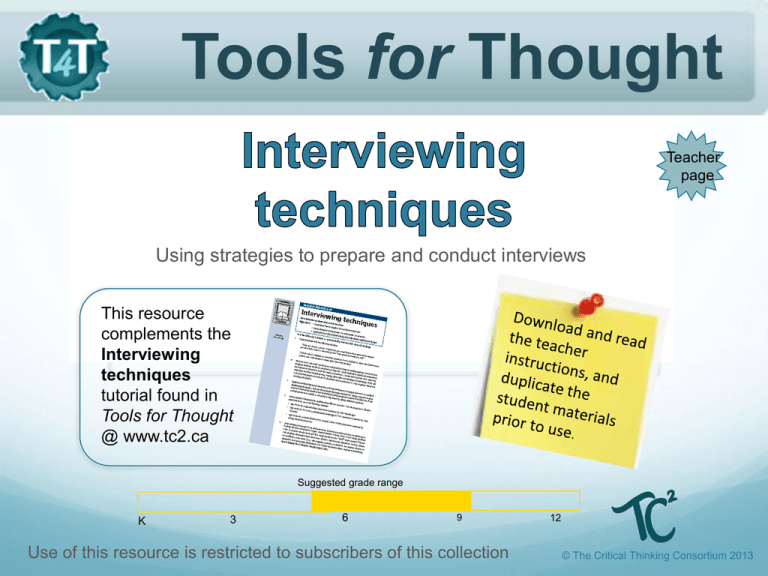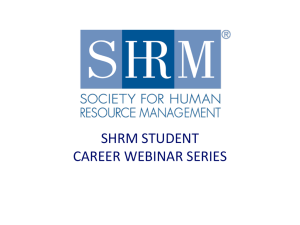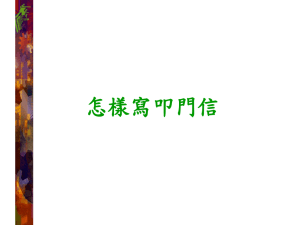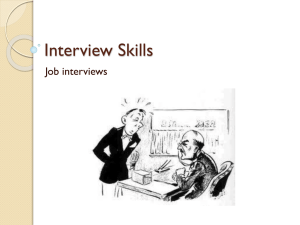Interviewing techniques - The Critical Thinking Consortium
advertisement

Tools for Thought Teacher page Using strategies to prepare and conduct interviews This resource complements the Interviewing techniques tutorial found in Tools for Thought @ www.tc2.ca Suggested grade range K 3 6 9 Use of this resource is restricted to subscribers of this collection 12 © The Critical Thinking Consortium 2013 Overview of learning activities Topic Slide Consider the situation 5 Compare interviews and conversations 6 Listen to an interview 7-9 Examine interview questions 10-13 Prepare for an interview 14-18 Conduct the interview 19 Assess the interview 20 Reflect on the strategy 21 Teacher page Tools for Thought Interviewing techniques Using strategies to prepare and conduct an interview Has anyone heard or seen someone being interviewed? What is the point of doing this? Student pages begin Interviewing techniques These strategies help get useful information from a person by conducting an effective interview. What will I learn? • what are the features of an effective interview and interviewer; • how to help prepare for and conduct an interview; • why interviewing is a useful information gathering technique. Consider this situation • Think of a person, current or historical, you would like to know more about. • Imagine you have been invited to meet this person. • What questions would you ask? Compare interviews and conversations What are the similarities and differences between an interview and a conversation? Interview Casual conversation Listen to an interview Listen to an interview and brainstorm qualities of an effective interviewer. George Stroumboulopoulos Interviews Peter Mansbridge Peter Gzowski Interviews Anna Maria Tremonti Photo credit: Mark Dunne Shelagh Rogers Think about criteria Criteria for an effective interviewer • asks engaging questions • is attentive • has genuine interest • is responsive • has background knowledge • Read the suggested criteria. • Compare the qualities of an effective interviewer you identified. • Determine the best possible criteria for an effective interviewer. Consider interview tips TIPS Preparation • Do your homework • Set a purpose • Look for springboards • Create questions • Remember necessities • Practice Interview strategies • Start easy • Ask the right questions • Have a conversation • Create questions • Pay attention to details • Read the tips. • Highlight new information • Rank order the five most effective tips. Examine interview questions • Think about the successful interview tips and the questions asked in the previous interviews. Credits : Dennis Mojado • What are the qualities of an effective interview question? Which question is most effective? 1. What is your favourite sport? 2. Do you think hockey is a great sport? 3. What motivates you as an athlete? Think about question criteria Criteria for an effective interview question • How closely do your criteria match the suggested criteria? • open ended • build on interesting background information • draw out interesting ideas and information • cover a range of relevant topics • Identify the most relevant criteria from the two lists. Examine questions A question may be ineffective because it is closed or leading or both. Open-ended questions tend to more effective because they encourage conversation and are less leading. Leading Questions (Ineffective) Open-ended Questions (More effective) Do you get along with your parents? Tell me about your relationship with your parents. - hints that maybe they don’t get along. - non-judgmental How fast was the red car going when it smashed it into the blue car? - the red car was at fault -suggests high speed Why did you disappoint your father? How fast was each car going when the accident occurred? - does not assign any blame or make assumptions Modify questions Work in partners to identify the flaws in each question Revise them to create effective questions Prepare for an interview Interview a classmate in preparation for writing a profile about this student for the “Know Your Neighbour” section of the school website • Create a briefing sheet about yourself to help the interviewer generate questions. • Include personal characteristics, talents or other information you would like to talk about in your interview Identify information • Working in pairs, exchange your briefing sheet with your partner. • Review the briefing sheet and identify important background information . Look at example Brainstorm questions • Review the information recorded from the briefing sheet. • Prepare your interview questions based on this information. Effective interview questions • are open ended • build on interesting background information • draw out interesting ideas and information • cover a range of relevant topics Look at an example Possible questions • • • • • • Why did your family move to Canada? What has been the most difficult adjustment to being in Canada? What have you like the best? What do you like best about our school? How did you become a drummer? Who is the person you admire most and why? Conduct the interview • Interview your partner. • After the interview Criteria for an effective interviewer • asks engaging questions • is attentive • has genuine interest • is responsive • has background knowledge discuss how well the interview met the criteria. Assess the interview Assessing my ability to “prepare and conduct interviews” • How well did you prepare and conduct the interview? • What did you learn about interviews? • What are the advantages and disadvantages of using interviews to gather information? Reflect on the strategy • How might you use the Student resource? • When might conducting an interview be a useful tool?







